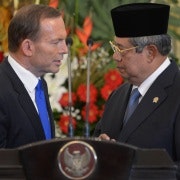Rudd's small steps in an asylum seeker labyrinth
In yet another iteration of asylum seeker policy, the government now says that people who destroy their documentation will be sent to the back of the processing queue.
This is distinguished from the opposition policy which declares they would effectively be knocked out of the queue altogether.
Whether you see the distinction as major or a matter of degree, the move is a further indication of Labor seeking to strengthen its armoury.
There is a lot more in common between the government and opposition on asylum than either admits. But because this is a cutting-edge election issue, the partisan confrontation is always to the fore. That has hampered the prospect of dealing with an influx that has gone from minor to out-of-control.
While once there was a contrast between a “tough” Coalition and a “soft” Labor approach, now both are committed to hardline positions, while simultaneously accusing each other of having policies that would endanger lives (turning back the boats) or rights (the Malaysia solution).
The government at the weekend admitted the Malaysian solution, even if it could be implemented, is not the answer anymore. Immigration Minister Tony Burke said “anyone can see” that something more comprehensive than the 800 places would now be needed.
The Coalition says the Howard government solved the boat problem. But that was more than a decade ago, when its proportions were more manageable. Whether any government can solve it now without high costs is another matter.
Rudd, whose scrapping of the “Pacific solution” is blamed for restarting the inflow, is seeking new solutions, which will include a crackdown on “economic migrants”.
He came out of his Indonesia trip with President Susilo Bambang Yudhoyono proposing a regional conference of “key origin, transit, and destination countries”. This would include Iran and Afghanistan.
The meeting would “explore concrete operational and policy responses, including regional approaches and efforts to enhance border security”, the communique after their talks said.
But a conference of itself is not a great breakthough, especially since the Bali process (of discussions for a regional solution) has been going for years.
It can be seen as a way of getting through the Rudd visit with something that looks positive.
To actually BE a major step forward a range of countries would need to agree to do more than now. Then they would actually have to DO what they had promised. We’ll be waiting a long time to make a judgement on how meaningful this initiative turns out to be.
Indonesia itself could be giving greater assistance. For example many people who end up as asylum seekers in Australia arrive by regular means into Indonesia, with documents. Better sharing of data by Indonesia (and Malaysia too) could help a good deal with the problem of lack of documentation.
The Indonesian relationship is now heavily in the mix of the asylum seeker argument, with Rudd asserting Abbott’s policy of returning boats would lead to diplomatic conflict, and hinting at worse.
The communique of the Rudd-Yudhoyono talks was interpreted as having a slap at Abbott’s policy. It referred to “the importance of avoiding unilateral actions which might jeopardise such a comprehensive regional approach and which might cause operational or other difficulties to any party”.
No one knows whether it would be possible to implement the Coalition’s turn-back policy; if these days it would deter people if it could be done (they are not deterred by the many drownings); or how strongly the Indonesians would feel about it if it were actually happening.
The opposition is simply choosing to ignore that the policy could strain the relationship, hoping that an agreement could be reached when it came to the point.
“We have a very co-operative relationship with Indonesia… They are aware of our policy and it won’t be unilateral action”, shadow foreign minister Julie Bishop said today (although immigration spokesman Scott Morrison said yesterday, “as John Howard proved, you have got to have unilateral action on our side that works”).
Rudd’s claims of what could eventuate under Abbott were unjustifiably and provocatively inflammatory, but it is possible that the Abbott line would see some deterioration in the relationship. Indeed this happened for a time under Howard.
The asylum seeker issue is a classic “wicked problem”. The Public Service Commission has a publication, Tackling Wicked Problems: A Public Policy Perspective, which examines the genre and is worth a read (although it does not specifically canvass the asylum question).
The term, it notes, is used “not in the sense of evil, but as a crossword puzzle addict or mathematician would use it – an issue highly resistant to resolution”. The terminology came from urban planners at the University of California in the early 1970s and has entered the public policy language.
“Wicked problems” are difficult to clearly define and often multi-causal; attempts to address them can have unforeseen consequences. They can be moving targets, usually have no clear solution, are socially complex, involve many players, and require behaviour to be changed.
“Some wicked problems are characterised by chronic policy failure”.
Sound familiar?
Michelle Grattan does not work for, consult to, own shares in or receive funding from any company or organisation that would benefit from this article, and has no relevant affiliations.
![]()
This article was originally published at The Conversation. Read the original article here.
















